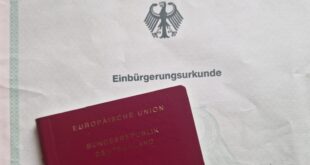Getting by as a migrant without papers is certainly hard – but if you become sick, it can be much worse, even life-threatening. Where can you turn to for help? Marion MacGregor/InfoMigrants reports
You arrived in Greece, Spain or Italy, but then travelled on to Germany. Or perhaps your asylum application was rejected and you have remained in Europe “illegally”. Throughout Europe, there are millions of migrants in this situation, living without legal residence status.
While there are no reliable figures, it’s estimated that there are as many as a million undocumented migrants in Germany alone. Here, undocumented migrants only have limited access to medical care. When they are ill, they sometimes try to get help through their own networks. Or they put off seeking medical help, with life-threatening consequences.
Who is entitled to medical care in Germany and in what circumstances?
As an asylum-seeker in any German state, you are entitled to healthcare benefits if you are receiving basic benefits under the Asylum Seekers’ Benefits Act (AsylbLG). This usually means within first 15 months of your residence in Germany. This applies to those who have applied for asylum or have a “Duldung” (temporary suspension of deportation status).
After this period, you are entitled to benefits based on current welfare provisions – in other words, full public health insurance.
What if you have no residency permit?
Undocumented migrants (those without a legal right to remain in Germany) are not generally entitled to free medical care because they are not insured. An exception is if you need to go to hospital in an emergency, since hospitals are legally obliged to treat any emergency patient. There should be no risk to undocumented migrants of being “found out” because hospital staff, whether medical or administrative, do not have a duty or right to report people with no legal residency to the police or immigration authorities.
However, there is a risk that the hospital will refuse to admit a patient without documents, such as an irregular migrant, despite the legal requirement. Hospitals do not get any money for treating uninsured patients, a fact which has led in the past to refusal and even sub-standard treatment.
In some German states it’s possible to apply for a medical certificate to visit the doctor, which you get from the social welfare office (Sozialamt). This process is not anonymous, so there is a risk that you will be reported to the immigration department.
A number of cities and states now offer an “anonymer Krankenschein” (anonymous medical certificate). This is issued by an independent refugee aid organization. A health professional from the organization assesses the medical needs and social situation of the individual and then issues either a medical treatment certificate or a health card, and refers them to a doctor or a hospital. This is financed by insurance companies, regional or state authorities.
Most, if not all German states now have “Clearingstellen” (clearing offices) for people without health insurance. These offer free, anonymous and confidential advice. They mostly help uninsured people who are actually entitled to health insurance to access it. The clearing offices are funded by the state health authorities.
Medinetz
Medinetz (also Medibüro) is a network of non-government organizations that offer help if you have no legal papers and you need to see a doctor in Germany. It is like the clearing offices but with an emphasis on medical care, rather than insurance. This service is also anonymous.
Every Medinetz service operates a bit differently, but their main function is providing a referral to see a doctor. Most of them have limited consultation hours — sometimes just a couple of hours a week — for visits in person, but they can also be contacted by phone or email.
To find a Medinetz service near you, do an internet search with “Medinetz” and your nearest city.
Charities and other services offering direct medical care
Several private groups and charities offer free medical care to undocumented migrants.
- The Malteser Catholic charity has 20 clinics throughout Germany providing medical and in some cases dental care for people without a residency permit.
- Praxis ohne Grenzen (clinics without borders) has clinics in Northern Germany and in Solingen.
- open.med is another service offering medical treatment and advice for migrants in difficult living situations or who have no insurance, in Berlin, Hamburg, Munich and Stuttgart.
- A list of clinics and services available across Germany can be found here. “Gesundheitsversorgung in Ihrer Nähe” means “healthcare services near you” — click on the blue bar and then choose a German state to see the local list.
© InfoMigrants
 THE AFRICAN COURIER. Reporting Africa and its Diaspora! The African Courier is an international magazine published in Germany to report on Africa and the Diaspora African experience. The first issue of the bimonthly magazine appeared on the newsstands on 15 February 1998. The African Courier is a communication forum for European-African political, economic and cultural exchanges, and a voice for Africa in Europe.
THE AFRICAN COURIER. Reporting Africa and its Diaspora! The African Courier is an international magazine published in Germany to report on Africa and the Diaspora African experience. The first issue of the bimonthly magazine appeared on the newsstands on 15 February 1998. The African Courier is a communication forum for European-African political, economic and cultural exchanges, and a voice for Africa in Europe.































